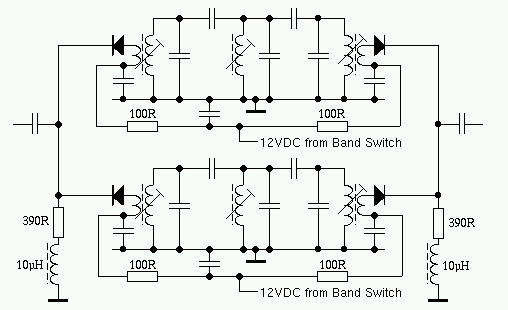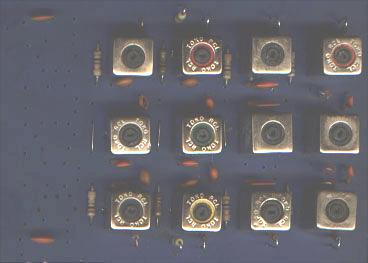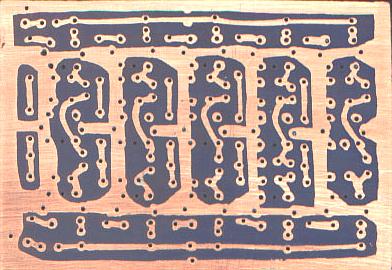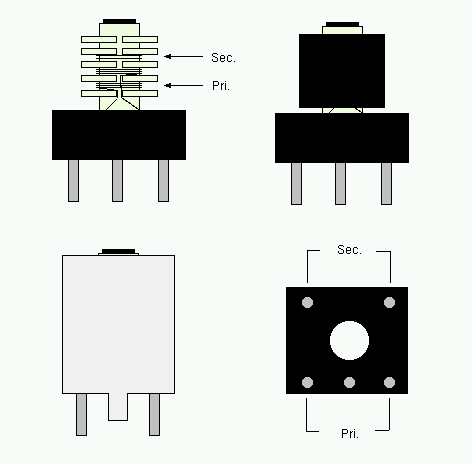RF BAND PASS FILTER
The band pass filter unit is one of the most important parts of of the
transceiver. The PCB has four filters and space for a fifth, in case I decide to
add an extra band later. There are three parallel tuned circuits in each filter.
Each tuned circuit is coupled to the next by a capacitor (C2, C3). Diodes are
used for input/output switching. The filters have an input and output impedance
of 50 Ohms.
 BAND PASS FILTER
BAND PASS FILTER
The schematic shows
the arrangement of the band pass filters and i/o switching. To keep things clear
and simple, only two bands are shown. You can have as many as you like. When
using ordinary Silicon diodes instead of proper PIN diodes, it is very important
to ensure that the DC current (more than 20mA in this circuit) is greater than
the RF signal current. The diodes in the filters that are switched out, have
several volts of reverse bias applied.
 BPF DETAIL
BPF DETAIL
 BPF TOP VIEW
BPF TOP VIEW
 PCB
PCB
Hand drawn PCB layout for the BPF
circuit board. I drilled the holes for the inductors first, then drew the PCB
tracks with an etch resist pen. It looks ugly but it works quite well. I used a
simple template to help drill the holes for the Toko inductors.
 DRILLING TEMPLATE
DRILLING TEMPLATE
 TOKO 10K Coil
TOKO 10K Coil
All of the inductors
were wound on Toko 10mm formers that were recovered from scrap equipment. These
transformers are used in television receivers, car radios, CB radios etc. Most
of the Toko formers in the BPF were stripped from an old VHF two way radio. The
metal screening can on the Toko coils is secured to the plastic base of the coil
former by four dimples. They can be flattened by using a carpet knife. It takes
a bit of pressure so BE CAREFUL. Once the metal can is out of the way, it
is quite easy to remove the copper wire from the former. Use a jewellers
screwdriver to break the wire away from the pins, then unwind the wire from the
former. If there is a capacitor in the base of the coil, cut the leads off and
remove it. Use enamelled copper wire for the new windings. See table below for
details.
| Band |
T1 |
T2 |
T3 |
C1 |
C2 |
C3 |
C4 |
C5 |
| 80M |
21T,4T |
21T |
21T, 4T |
270p |
22p |
22p |
270p |
270p |
| 40M |
18T, 3T |
18T |
18T, 3T |
100p |
7p |
7p |
100p |
100p |
| 17M |
10T, 2T |
10T |
10T, 2T |
47p |
5p |
5p |
47p |
47p |
| 10M |
8T, 2T |
8T |
8T, 2T |
33p |
3p |
3p |
33p |
33p |
COMPONENT VALUES
The inductance of a
Toko 10K coil is approximately: L in microHenries = (16 * turns squared)/1000.
Despite the fact that there are many different types of 10mm inductors, this
formula usually gives reasonably accurate results. This type of coil has a
tuning range of about 30%. I tested the BPF unit by connecting it to the input
of my nine band HF rig. The 40M, 17M and 10M filters worked perfectly, the 80M
filter was very lossy. I had to change the original 220pf capacitors to 270pF to
get it working properly. I used ceramic disc capacitors for everything except
the 0.1mFd de-coupling capacitors. They are surface mount types, mounted on the
solder side of the board.
BACK TO HF TRANSCEIVER
PAGE
EI9GQ HOME BREW RADIO
PAGE






